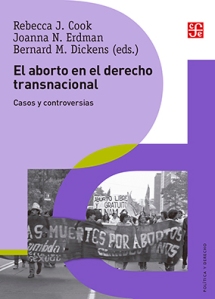Congratulations to Dr. Ciara O’Connell, now a Research Fellow at the Law School of Trinity College Dublin, whose 2017 doctoral thesis from the University of Sussex is now freely accessible online. We are pleased to circulate her abstract, into which we have inserted {in curly brackets} her introductions to the three Inter-American cases she analyzed.
Ciara O’Connell, “Women’s Reproductive Rights: Repairing Gender-Based harm in the Inter-American System of Human Rights,” PhD diss., University of Sussex, U.K., School of Law, Politics and Sociology, March 2017. Doctoral thesis online.
This thesis examines women’s reproductive rights litigation before the Inter-American System of Human Rights and determines how the Inter-American System can more effectively take account of, and repair, harms specific to women in reproductive rights cases. It builds upon a growing body of literature on women’s rights in the Inter-American System, and employs feminist socio-legal methodologies to identify the structural obstacles which cause violations of women’s reproductive rights, and to challenge the gap between gender-based rhetoric and reparation in women’s reproductive rights cases. The thesis centres around three specific cases. These cases are critically examined using the Holistic Gender Approach to Reparations developed by Ruth Rubio-Marín and Clara Sandoval. In applying this Approach to the case studies, it is possible to determine how, to what extent and to what effect, each reproductive rights case incorporates gendered harm in its reparation design.
{The cases selected for this research project are emblematic in nature, and represent violations of women’s reproductive rights on a massive scale. The first case study examines María Mamerita Mestanza Chávez v. Peru, which was a Friendly Settlement Agreement. This case remains open before the Inter-American Commission on Human Rights, and was selected because it addressed the coercive sterilization of thousands of Peruvian women, and because the Agreement included an analysis, albeit limited, of socio-cultural discrimination as a cause of women’s reproductive rights violations.
The second case, Paulina del Carmen Jacinto Ramírez v. Mexico, was also a Friendly Settlement Agreement, but in this case the State and the victim reached an agreement before the Inter-American Commission on Human Rights formally admitted the case. The case was an abortion rights case that highlights the restrictions women and girls face when attempting to access their legal rights to abortion services. The Inter-American Commission closed this case, despite the fact that the State of Mexico failed to comply with all of the measures of the Friendly Settlement Agreement. The analysis conducted of each of these Agreements highlights the potential of the Friendly Settlement Agreement mechanism to transform the reproductive lives of women through gender-based reparations.
The final case, Artavia Murillo et al. v. Costa Rica, was selected for analysis because it is, at this point, the Inter-American System’s only binding reproductive rights judgment, and as such, it is the first glimpse into the Inter-American Court’s approach to repairing gender-based
harm in a reproductive rights case. This case examined the right to in vitro fertilization for heterosexual married couples in Costa Rica, and is especially significant because the Inter-American Court expanded the definition of reproductive health, and included an analysis of the disproportionate impact of gender stereotyping on the lives of women.}
(pp. 8-9)
This research utilizes doctrinal and empirical research methods to draw conclusions about how the Inter-American System and members of civil society such as women’s rights organizations and litigators can expand upon and improve the Inter-American System’s approach to repairing and eliminating violations of women’s reproductive rights. Through information gathered from interviews with actors familiar with the case studies and the Inter-American System, this thesis determines a number of strategies to improve the transformative potential of reparations issued by the Inter-American Commission and Court. These strategies, when combined with the Holistic Gender Approach to Reparations, establish the foundation on which to develop a “gender reparations tradition” within reproductive rights litigation before the Inter-American System of Human Rights.
The entire thesis (272 pages, PDF) can be downloaded here: Doctoral thesis.
Related Resources:
Ruth Rubio-Marín and Clara Sandoval, “Engendering the Reparations Jurisprudence of the Inter-American Court of Human Rights: The Promise of the ‘Cotton Field’ Judgment” (2011) 33:4 Human Rights Quarterly 1062-1091. English PDF.
“Human Rights to In Vitro Fertilization” by Fernando Zegers-Hochschild, Bernard M. Dickens and Sandra Dughman-Manzur, International Journal of Gynecology and Obstetrics 123 (2013) 86–89. English PDF. Texto y PDF en Español
Gender Stereotyping: Transnational Legal Perspectives, by Rebecca J. Cook and Simone Cusack (Philadelphia: University of Pennsylvania Press, 2010). About the book. Spanish edition (311 pages) PDF
______________
Compiled by: the International Reproductive and Sexual Health Law Program, reprohealth*law at utoronto.ca. See Program website for our Publications, Information resources, and Reprohealthlaw Commentaries Series. TO JOIN THE REPROHEALTHLAW BLOG: enter your email address in the upper right corner of our blog, then check your email to confirm the subscription.



 Posted by reprohealthlaw
Posted by reprohealthlaw 



